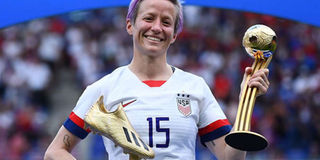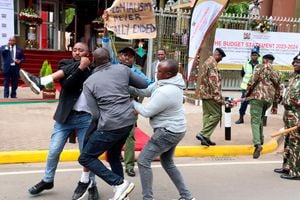How Megan Rapinoe became the global face of equal pay

United States' forward Megan Rapinoe poses with the Golden Boot and Golden Ball awards after the France 2019 Women’s World Cup final match between USA and the Netherlands, on July 7, 2019, at the Lyon Stadium in Lyon.
What you need to know:
- Megan Rapinoe was Fifa's Women’s Player of the Year and Ballon d’Or winner in 2019.
- In the same year, she became only the fourth woman to ever win the Sports Illustrated Sportsperson of the Year, in its 65-year existence.
The definitive memoir One Life is a testament to the resilience of Megan Rapinoe, the prolific asset in women's football.
She's an international advocate for the rights of women athletes. In 2019, she was Fifa Women’s Player of the Year and Ballon d’Or winner. In the same year, she became only the fourth woman to ever win the Sports Illustrated Sportsperson of the Year, in its 65-year existence.
Megan is a valiant voice against racism, bigotry, police brutality and mass incarceration. Her book magnifies her outstanding journey to becoming the international face of equal pay.
The history of women’s football leagues is a tale of volatile enterprises, under-investment, small crowds, prevalent disappointments, and under-compensation.
The first-ever female American league, Women’s United Soccer Association, commenced in 2001. It grew out of the victory of the well-attended 1999 Fifa Women’s World Cup hosted by the US.
While studying at the University of Portland and playing for the Portland Pilots, Megan survived on a combination of her soccer scholarship and small stipends from the National Olympic Committee for playing in the national team.
She was on a dismal WPS player salary of $32,000 a year from March 2003 after she was drafted by the Chicago Red Stars.
She then signed a contract with the national team and was placed on a desolate tier two salary of $50,000 annually, with a daunting possibility of moving to tier one, and her salary increasing to $70,000.
Remuneration
At that time, she didn't think anything of the remuneration, because she had no idea what members of the US men’s national team, which had never won an Olympic Gold medal or World Cup trophy, were earning.
She later realised the male national team players received a minimum bonus per game, regardless of the outcome. Women received payment bonuses only if they won, and if the team they defeated was ranked within the Fifa’s top 10. In any given year, a top tier women’s national team player would earn 38 per cent of an equivalent of the compensation of a men’s team, a bastion of male privilege.
When the men’s and women’s national teams each played 20 friendly matches in a year, the men would earn an average of $263,320, while the women would earn $99,000.
Heading for the 2012 London Olympics, where they won gold, the US team was the top-ranked women’s team in the world. The men were ranked 35th in the male category, yet they earned significantly higher.

The cover of Megan Rapinoe's memoir, One Life.
Megan then foreshadowed more of what was transpiring, their bonus structure was also inferior to the men’s, each male national team player received $5,000 for losing a friendly match, and a female player received $1,350 for a win, and nothing whatsoever for a loss or a draw.
Yet, the women’s national team perennially exceeded revenue projections by $16 million in 2015, when Megan emphatically led them to a 5-2 World Cup final victory over rivals Japan in Vancouver, Canada. Avenging their Japanese slugfest final defeat four years earlier in Frankfurt, Germany, in 2011.
The men’s team was in the red, exceeding no revenue projections, only qualifying for the last 16 stage in Salvador at the men’s World Cup in Brazil 2014 and failing to qualify for the 2018 World Cup in Russia.
There were other disparities like the per diems they received when they travelled. The women received $50 a day and the men $62.50. On top of that, the average yearly wage bill for the men's US Major League Soccer was $8.1 million, while the average yearly wage bill for the Women’s Professional Soccer League was a perplexing $25,000.
After culmination of years of contested negotiations with US Soccer Federation President Sunil Gulati and CEO Dan Flynn, the US Women’s team, led by Megan, hired a new lawyer who looked into the disparities and filed a formal complaint, with the Equal Employment Opportunity Commission, before the 2016 Rio Olympics.
They demanded a new profit-sharing model to reflect the huge gains in revenue generated by the success of the women’s team and their Name Image and Likeness. The federation refused to honour their demands. Megan and her team then asked for the same match bonus deal as the men, but the federation rejected it.
Class action
On March 8, 2019, Megan and her lawyer filed a class action lawsuit against the US Soccer Federation, alleging deliberate gender discrimination—a clear-cut case of women being paid and valued less for their work, because of their gender and entrenched male superiority.
The US Women’s team was number one in the world. They had won four Women’s World Cup titles and four Olympic gold medals. They had generated $50.8 million in revenue between 2016 and 2018, and a year later they won the 2019 World Cup final in Paris, France, watched by a staggering 1.12 billion global audience.
On February 22, 2022, the US soccer federation, in a landmark settlement of the class action, paid the US Women players a lump sum of $22 million and a consolidated $2 million to benefit them in their post-career goals.
According to the settlement, the federation would henceforth pay men and women equally, in all World Cup tournaments and future friendly matches.
The reviewer is a novelist, a Big Brother Africa 2 Kenyan representative and founder of Jeff's Fitness Centre (@jeffbigbrother).





